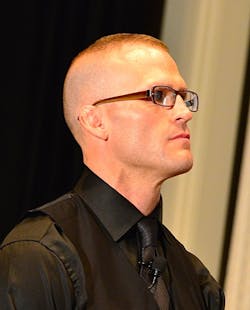Leadership Lessons: “You Don’t Know What You Don’t Know”
When you operate tactically in a manner that’s viewed as “normal” or “the way you’ve always done it,” and you achieve successful outcomes over and over again, you never learn how to operate any differently, because you don’t step outside your comfort zone to train and educate yourself. As a result, you believe your tactics are and will remain effective and proficient. The problem: Eventually, you’ll respond to an incident where your normal tactics aren’t effective, and as a result, you won’t be able to determine the correct course of action. This situation is known as a pattern mismatch.
RPD defined
Over time, due to education, experience, culture, and other related factors, we form a pattern in our minds for how to respond to incidents. This action leads us to make decisions via a process known as recognition-primed decision (RPD) making. We store knowledge over time so that we can utilize it when needed to make a decision on an incident or life in general. Simply put, RPD aids us in our decision-making process.
Think about it this way: Have you ever been on an incident where you saw something dramatic, extreme, unusual, etc., and you said to yourself, “There’s no way that’s happening right now—no way.” It may feel like you’re having an out-of-body experience while watching the event unfold, when really your mind is just trying to comprehend what you’re seeing. But if you’ve never experienced or witnessed the given event before, you’ll have difficulty making a timely and effective decision, which is rather scary when you’re tasked with resolving emergency scenes that may impact numerous lives.
A winning combination: experience and education
This is the main reason why we as firefighters, officers, administrators, training officers, fire marshals, etc., must train continuously. We must ensure that we have the experience and education to make a quick yet sound decision in life-altering situations. We cannot rely solely on how long we’ve been on the job anymore. I’ve worked with individuals who have 20-plus years of experience, but they’ve never evolved in that timeframe. Twenty-plus years of experience is great if you’ve continued to learn and improve, but if you rely solely on your number of years on the job as your source of knowledge, you’ll eventually fail and someone will either get hurt or tragically lose their life.
What don’t I know?
Have you ever heard the saying, “You don’t know what you don’t know?” Reflect on those seven words and then ask yourself, “What don’t I know?” It’s hard to ascertain what you don’t know if you don’t step outside your comfort zone and learn from other individuals and organizations.
Remember: Neither you nor anyone else in this profession knows everything. If you follow others blindly because of the color of their shirt or because they tell you, “that is the way we’ve always done it”, eventually, an event bigger than you or anyone else in your organization will occur, and when it does, no one will know how to operate tactically or manage the incident.
No more “neck down”
When I joined the fire service, I was told that I was hired from the neck down and to just keep my mouth shut and do what I was told. That method may have worked decades ago, but it does not work now and it does not have a place in this profession. If you’re an officer who’s afraid to learn from your subordinates or you’re intimidated when they have an idea that could bring about positive change, then you have a serious problem with your leadership skills.
Neither myself nor anyone else in this profession was hired from the neck down. We work in a collaborative environment, where a firefighter working their first shift could be placed in a situation that requires them to save someone who’s been on the job for 20 years or more. When this new firefighter is tasked with this terrible situation, do you think the veteran is going to say, “Keep your mouth shut, and don’t help me because we hired you from the neck down?” I think not. Instead, they’ll want that new firefighter to think critically and perform their job practically to save their life. Think about it. It could be you. Cheers.
About the Author

Dr. David Griffin
Dr. David Griffin is the assistant chief of administration in Charleston, SC, and is a Firehouse Contributing Editor He was the operator of the first-due engine on June 18, 2007, when nine of his fellow firefighters perished. Griffin has come through the ranks in operations in every uniformed position, from firefighter to battalion chief and shift commander to his current position, during his 20-year career in Charleston. He has a bachelor's degree in education from The Citadel, a master's degree in executive fire service leadership, and a doctorate of education in organizational leadership and development. Griffin is the author of "In Honor of The Charleston 9: A Study of Change Following Tragedy," among three other books. He is an international speaker and instructor, a certified Chief Fire Officer and Chief Training Officer with The Center for Public Safety Excellence, an IFSAC/Pro Board-certified Fire Officer IV and a graduate of the Executive Fire Officer Program from the National Fire Academy. He is a graduate of Harvard University's Kennedy School of Executive Education program: Senior Executives in State and Local Government and of the Psychology of Leadership program at Cornell University's SC Johnson College of Business. Griffin is the owner of On A Mission, LLC, at drdavidgriffin.com.
